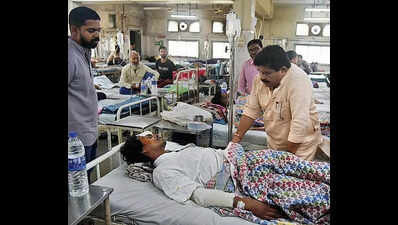
On Monday night, as the speeding BEST bus struck vehicles and people on its way near Anjuman-e-Islam School in Kurla (West), onlookers directed at least 49 injured victims to the nearest Bhabha Hospital, hoping it would be the best chance to save lives. This well-intentioned move, however, backfired.
A peripheral hospital, Bhabha was not well-equipped to handle the influx of patients, noted its medical superintendent Dr Padmashree Ahire.
“We immediately prepared beds in the area, previously designated for COVID-19 patients. Our entire team was mobilised regardless of duty hours,” said Dr Ahire, adding that the incident was nothing like she had seen before at the Hospital. “Our resources are limited,” she noted. The area where the incident occurred held close proximity to Sion Hospital, a tertiary care facility, which has more staff and is better prepared to manage incidents of this magnitude.
Abdul Rehman Isroo, neighbour of 52-year-old Fazlu Rehman who is now in critical condition at Sion Hospital with chest trauma after being transferred there form Bhabha, said, “It was only after reaching Bhabha that families began to realise that Sion Hospital would have been a better option.”
There were many like him. For instance, 22-year-old Mahtab Shaikh, who was struck by the bus while on his way to a wedding, is battling for his life at Sion Hospital, where he was rushed after medical infrastructure at Bhabha proved insufficient. Alim Akhtar, his neighbour who witnessed the chaos from across the street, recalled, “When we realised Bhabha lacked adequate doctors and resources, we spent an hour at Bhabha trying to get him transferred to Sion Hospital.”
Sion’s AMO, Dr Mayur Patil, said, “Peripheral hospitals are not equipped to handle such large-scale casualty. For families and onlookers, Bhabha seemed like the smartest option at the time, but ideally, the casualties should have been taken to Sion.”
The problem was exacerbated as relatives were forced to haggle with BMC’s in-house private diagnostic partner, Krsnaa Diagnostics, which demanded payment for scans required for emergency services. The families said the price was anywhere between Rs 1,200 to Rs 4,000. The cost was waived only after local politicians intervened.